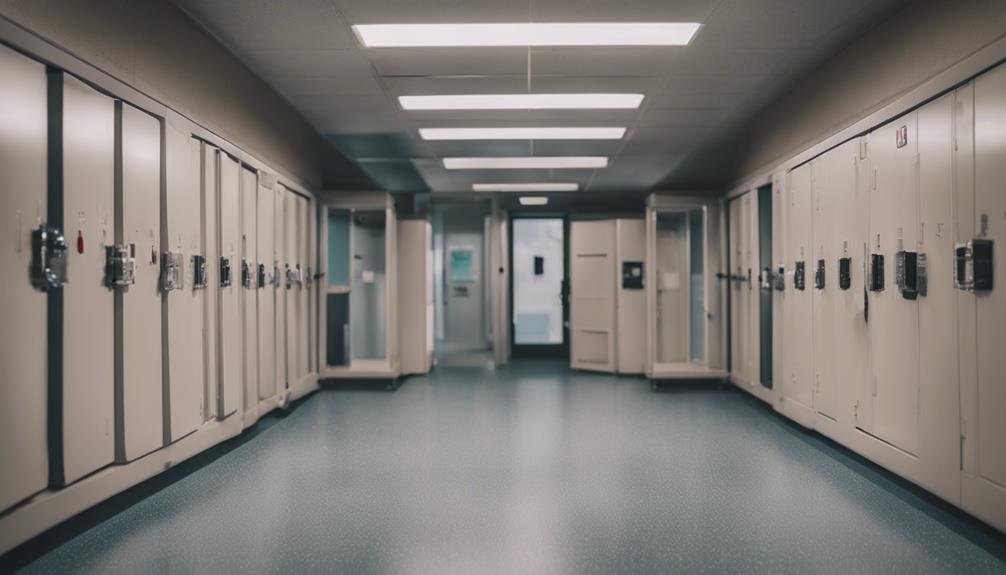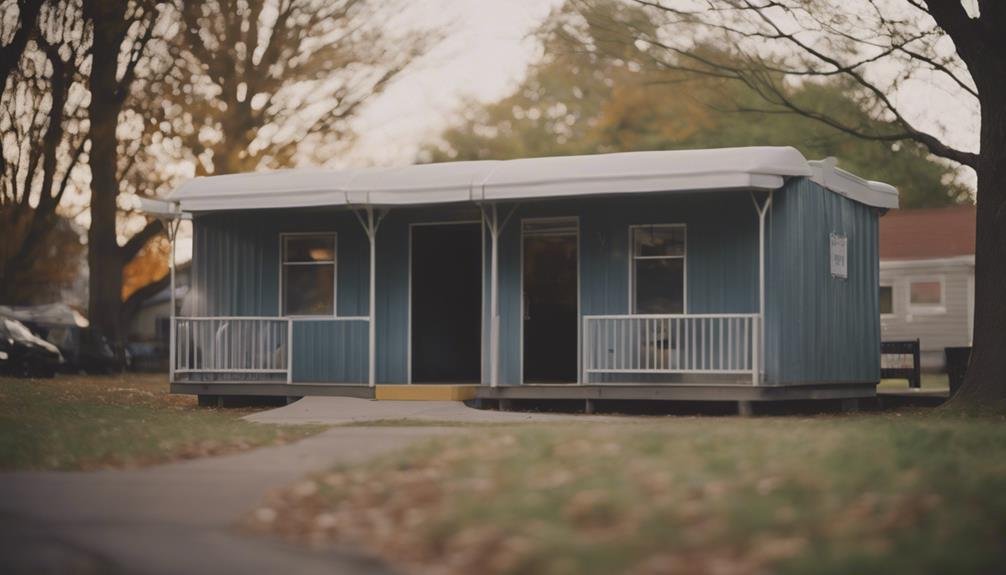Explore the top 7 emergency shelters for abuse victims. These shelters offer safe havens with amenities prioritizing your well-being and security. Trained staff provide crisis intervention, counseling, and necessary services around the clock. You’ll receive personalized safety plans, legal advocacy, and specialized care for children and youth. Experience trauma-informed care in healing environments, empowering your healing journey. These shelters connect you with community resources and offer vital support and stability programs. Find essential support and a lifeline for a brighter tomorrow.
Key Takeaways
- Safe, clean, and comfortable amenities prioritizing well-being and confidentiality.
- 24/7 access to trained staff for safety planning, counseling, and support.
- Trauma-informed care with compassionate, tailored services for survivors.
- Community connections for rebuilding lives and accessing essential resources.
- Transitional housing programs ensuring long-term safety, stability, and healing support.
7 Best Emergency Shelters for Abuse Victims
For individuals seeking refuge from abuse, various safe shelter options are available to provide temporary housing and essential support services. Emergency shelters offer a haven for those fleeing abusive situations, providing safe, clean, and comfortable amenities to help you feel secure during a difficult time. These shelters are staffed with caring professionals who can assist you in creating a personalized safety plan and offer support through case advocates.
Moreover, if you have children or youth with you, rest assured that they’ll receive specialized care to address the trauma of abuse and help them feel safe and supported.
In addition to shelter, these facilities provide access to a range of services such as counseling, career development support, childcare, and educational programs to empower you as you work towards rebuilding your life. Remember, you aren’t alone, and help is available to assist you on your journey to healing and safety.
Immediate Crisis Intervention Services
In times of urgent need, immediate crisis intervention services at emergency shelters offer essential support and resources for abuse victims seeking safety and assistance. These services are designed to provide a safe haven for individuals and families experiencing the devastating effects of family violence. Emergency shelters provide 24/7 access to trained staff who can assist with safety planning, counseling, and connecting survivors to necessary services. Abuse victims can find temporary shelter, food, clothing, and medical assistance to address their immediate needs in a secure environment.
Case advocates at emergency shelters play a critical role in working with survivors to set goals, develop personalized safety plans, and access legal advocacy services. Additionally, children and youth at these shelters receive specialized care and support to address the trauma of abuse, ensuring their safety and well-being is a top priority.
The immediate crisis intervention services provided at emergency shelters are essential in helping abuse victims navigate through their crises and begin the journey towards healing and recovery.
Trauma-Informed Care Facilities
You deserve to feel safe and supported as you navigate your healing journey.
Trauma-informed care facilities prioritize your well-being by offering safety-focused approaches and creating environments centered on healing.
The staff at these facilities are trained to provide compassionate care tailored to your unique needs, empowering you towards recovery.
Safety-Focused Care Approaches
Amidst the trauma and challenges that abuse victims face, safety-focused care approaches at trauma-informed facilities play a vital role in providing a supportive and healing environment. These facilities prioritize safety and healing by utilizing evidence-based practices that recognize the impact of trauma on individuals.
Safety-focused care approaches are designed to empower and protect abuse victims during their stay, ensuring they feel secure and supported. Staff members undergo specialized training to offer compassionate and understanding care, fostering an environment where survivors can begin their healing journey.
By creating a safe space within trauma-informed care facilities, abuse victims are given the opportunity to heal and rebuild their lives free from fear and harm. The focus on safety not only physically protects individuals but also emotionally supports them through their recovery process.
In these facilities, safety-focused care approaches are integral to providing the necessary foundation for survivors to regain their strength and sense of security.
Healing-Centered Environments
Healing-Centered Environments in trauma-informed care facilities provide a sanctuary for abuse victims to navigate their journey towards recovery and empowerment. These specialized shelters prioritize creating safe and supportive spaces where survivors can heal from the traumas they’ve experienced. By focusing on trauma-informed care, these environments address the emotional, mental, and physical well-being of individuals who’ve escaped abusive situations.
Within Healing-Centered Environments, abuse victims receive tailored services and resources designed to meet their specific needs. The goal is to promote healing, recovery, and empowerment for those seeking refuge from abuse. These facilities understand the profound impact of trauma on survivors and work diligently to provide a nurturing and understanding atmosphere where individuals can start their healing process.
In these environments, individuals can find solace, support, and the tools necessary to initiate their journey towards a brighter and more hopeful future. Healing-Centered Environments serve as beacons of hope and strength for those on the path to reclaiming their lives.
Supportive Staff Training
Specialized staff training in trauma-informed care facilities equips personnel with the knowledge and skills to effectively support abuse victims on their journey towards healing and empowerment. By receiving training that focuses on understanding the impact of trauma, recognizing signs of distress, and implementing evidence-based practices, staff members are prepared to provide essential services to those in need.
This training equips them to create safe and supportive environments, empower survivors, and promote healing from past experiences.
Through compassionate support, mental health services, safety planning, and therapeutic interventions, staff at trauma-informed care facilities address the complex needs of abuse victims. By prioritizing survivor-centered approaches, empathy, and understanding, these facilities offer a holistic and personalized approach to help individuals heal and rebuild their lives.
This dedicated training ensures that staff can offer the highest level of care and support to those seeking refuge and assistance in times of crisis.
Confidential Support Resources
If you’re in need of confidential support resources as an abuse victim, there are hotlines, shelters, and online chats available 24/7 to provide immediate help and assistance.
The National Domestic Violence Hotline offers crisis intervention, safety planning, and referrals for individuals experiencing abuse. You can text ‘START’ to 88788 or call 800-799-SAFE (7233) for immediate support.
Shelters under the Family Violence Program Resources not only provide a safe haven but also offer legal assistance and community education for abuse victims. Additionally, non-residential support centers are available for those affected by family violence who don’t require emergency shelter. These centers offer essential services and support without the need for residing in a shelter.
Secure Housing Solutions

When seeking secure housing solutions at emergency shelters, your safety and security are the top priority. These shelters offer essential amenities like food, clothing, and a safe place to sleep, ensuring you have the basics covered.
Additionally, support services such as counseling, legal advocacy, and safety planning are available to help you navigate this difficult time with guidance and care.
Safety and Security
In emergency shelters for abuse victims, guaranteeing safety and security through secure housing solutions is paramount. Survivors of family violence deserve a place where they can feel protected and supported as they navigate through challenging times.
Emergency shelters provide a secure environment where individuals can find refuge from abusive situations. These shelters are equipped to offer not only a safe place to stay but also access to essential services such as counseling, safety planning, and round-the-clock assistance. Confidentiality is strictly maintained to ensure the privacy and security of survivors of abuse.
Shelter Amenities
Ensuring safety and security in emergency shelters for abuse victims involves providing secure housing solutions that prioritize the well-being and confidentiality of survivors. Shelter amenities play a significant role in creating a safe environment for individuals fleeing abuse. These amenities encompass safe, clean, and comfortable accommodations that offer a sense of security and privacy. Clients at emergency shelters not only receive personalized safety plans but also have access to support staff who are dedicated to their well-being.
Moreover, children and youth staying at these shelters benefit from specialized care and programs tailored to address the trauma they’ve experienced. Services go beyond just providing a physical shelter; they include counseling, career development assistance, childcare options, and educational support.
Support Services
By offering secure housing solutions, emergency shelters provide a lifeline for abuse victims seeking safety and support during times of crisis. These shelters go beyond just offering a safe place to stay; services are provided to address the diverse needs of survivors.
In addition to temporary housing, individuals can access a range of support services aimed at helping them manage their journey to healing and independence. Counseling services are available to provide emotional support and guidance, legal advocacy can assist with dealing with the legal system, and children’s services offer specialized care for young survivors.
By offering these extensive services, emergency shelters create a nurturing environment where individuals can begin to rebuild their lives free from abuse. Accessing these support services is a critical step towards breaking the cycle of violence and empowering survivors to move forward with hope and resilience.
Community Connections for Rebuilding
Empowering survivors of abuse, Community Connections for Rebuilding focuses on providing essential support and resources to aid in the process of rebuilding lives. This program offers a network of community resources tailored to survivors, helping them connect with important services necessary for their healing journey.
By emphasizing guidance, assistance, and access to local support systems, Community Connections for Rebuilding aims to empower survivors by fostering connections within the community. Through engagement with various community services, abuse victims can benefit greatly, finding the necessary aid to navigate their path towards healing and independence.
Long-Term Safety and Stability Support

To promote the safety and stability of abuse victims in the long term, support programs often include transitional housing options that provide an essential stepping stone towards healing and securing permanent housing. Transitional housing programs offer survivors free or reduced-rent apartments where they can rebuild their lives after experiencing abuse.
Research shows that survivors who participate in transitional housing programs experience positive outcomes, indicating the effectiveness of this support approach. Family violence programs play an important role in implementing best practices for transitional housing, ensuring that survivors receive the necessary resources and support during their stay.
Additionally, peer support within transitional housing programs is instrumental in facilitating the healing process for abuse victims, as it creates a sense of community and understanding among individuals who’ve gone through similar experiences.
Frequently Asked Questions
How Can I Maintain My Privacy and Confidentiality at the Shelter?
To maintain privacy and confidentiality at the shelter, safety measures are in place. Trust staff, communicate your needs, and utilize designated spaces. Your well-being is a top priority, and your privacy will be respected.
Are Pets Allowed at the Emergency Shelter Facilities?
When thinking about pet accommodations, it’s important to check with the shelter beforehand. Some places offer this service, but others may not. Remember, every cloud has a silver lining, and solutions can be found.
Do the Shelters Provide Childcare Services for Residents?
Childcare options at shelters can vary. Some provide childcare services to assist residents. It’s important for your safety and well-being to inquire about available support for your children. Remember, you deserve help and care.
Can I Bring My Own Medications to the Shelter?
Can you bring your medications to the shelter? Yes, you are encouraged to bring your medications for proper medication management. Your health and well-being are a top priority, and the shelter staff will assist you with this.
What Kind of Legal Support Is Available for Abuse Victims at the Shelter?
You’ll find a range of legal options and support at the shelter. Advocates can help with protection orders, court accompaniment, and connecting you to legal resources. Your safety and well-being are our priority.
Conclusion
In times of crisis, having a safe shelter can be a beacon of hope in the storm. These emergency shelters for abuse victims offer essential support and resources to help you navigate through difficult times.
Remember, when life gives you lemons, these shelters are here to help you make lemonade. Stay strong, reach out for help, and know that you aren’t alone. You deserve safety, support, and a brighter future ahead.







